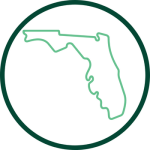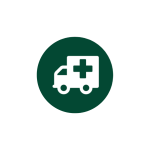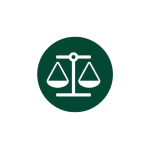Florida State Resources

This page has information specific to this state, including contact information for federal and state agencies, and some key information about laws and consumer protections. Sometimes, state laws are more protective than federal law. For more information on this state's specific laws (e.g., on employment or health insurance), visit Triage Health's Charts of State Laws.
Browse Resources
Advocacy

- For more information on state services, state agencies, and elected officials, you can view the state government website.
- For more information on how to register to vote in this state, visit the Florida Division of Elections website.
- View state legislative information, including the legislature's daily schedule and information on current legislative bills.
- For additional information and resources related to advocacy, visit Triage Cancer's Advocacy Resources.
Disability Insurance

Federal Disability Programs
- The Social Security Administration (SSA) administers two disability benefits programs: Social Security Disability Insurance (SSDI) and Supplemental Security Income (SSI). For more information on each program and how to apply, visit the SSA Disability Benefits website.
- SSI provides monthly financial assistance to individuals who have: 1) a disability, or are age 65 or older, 2) a low-income level, and 3) low resources. Some states add money to the federal SSI payment. You can learn about California's supplement here.
- Find your local SSA office
- For more information on disability insurance, visit Triage Health's Disability Insurance Resources.
Private Disability Insurance
- You can also purchase short-term and/or long-term disability insurance directly from a private insurance company or this type of insurance may be offered by your employer as an employee benefit. See our Quick Guide to Long-Term Disability Insurance for more information.
Employment

Federal Fair Employment
- The U.S. Equal Opportunity Employment Commission (EEOC) is responsible for enforcing federal laws that make it illegal to discriminate against a job applicant or an employee because of the person's race, color, religion, sex (including pregnancy, transgender status, and sexual orientation), national origin, age (40 or older), disability, or genetic information. The laws apply to all types of work situations, including hiring, firing, promotions, harassment, training, wages, and benefits. For more information about the EEOC, including how to file a complaint, visit the EEOC's website, call 800.669.4000, or email info@eeoc.gov.
- The Job Accommodation Network (JAN) is a program funded by the U.S. Department of Labor, that provides free, expert, and confidential guidance on job accommodations and disability employment issues. They also have several resources on how to approach an employer to request a reasonable accommodation under the Americans with Disabilities Act and a Searchable Online Accommodation Resource where individuals can find suggested accommodations based on job duties or limitations that they are experiencing. For more information, visit the JAN website, call 800.526.7234, or email jan@AskJAN.org.
State Fair Employment
- To learn more about your state's fair employment laws, including information about discrimination in the workplace and how to file a complaint, visit the Florida Commission On Human Relations website, or call 850.488.7082
State Unemployment
- Florida's program is administered by the Florida Department of Economic Opportunity, 850.245.7105
- You must have lost your job through no fault of your own, so you must not have quit for personal reasons or been terminated for misconduct. Claimants who are partially employed may apply if an employer cut the claimant’s hours against the claimant’s will.
Vocational Rehabilitation
- Your state's Vocational Rehabilitation agency provides vocational rehabilitation services that are designed to help job seekers with disabilities obtain competitive employment in integrated work settings. For more information on their services, eligibility requirements, and how to apply, visit the Florida Department of Education, Division of Vocational Rehabilitation, 850.245.3399
More Information
- For more employment resources, visit Triage Health's Employment Topics Page.
Employment - Taking Time Off

Federal Leave Laws
- The U.S. Department of Labor Wage & Hour Division enforces the Family & Medical Leave Act (FMLA) (866.487.9243). The FMLA is a federal law that allows eligible employees to take up to a total of 12 weeks of unpaid, job-protected leave per year under certain circumstances.
State Family & Medical Leave (for self & for caregivers)
- Some states have family and medical leave that also benefits caregivers. Florida does not currently have a family & medical leave law.
State Paid Family Leave (for caregivers)
- Some states have paid family leave for caregivers. Florida does not currently have a paid family leave law.
State Paid Sick Leave (for self)
- Some states have paid sick leave for individuals. Florida does not currently have a paid sick leave law.
- Some states have kinship laws that allow you to use your sick leave to care for a child. Florida does not currently have a kinship law.
State Paid General Leave (for any reason)
- Some states provide general paid leave. Florida does not currently have a general leave law.
State Bone Marrow Donation Leave
- Some states provide leave to donate bone marrow. Florida does not currently have a bone marrow donation leave law.
County & Local Leave
- Some cities and counties have additional leave laws.
Workplace Leave Policies or Employment Contracts
- Everyone’s situation is different. Check your employee handbook, your workplace policies, and/or your employment contract (if you have one) to see whether you are eligible to take paid or unpaid time off from work.
More Information
- For more information about leave laws in each state, see our chart on taking time off from work.
- For more employment resources, visit Triage Health's Employment Topics Page
Estate Planning

Finances

For information on financial assistance resources, you can visit our Financial Assistance Resources module. You can then pick from the different categories of financial assistance, to find organizations that may provide financial help to you. Think creatively. For example, if you cannot find anything to help with your medical bills, you may qualify for utility assistance and shift the money you had dedicated to utilities to your medical bills.
- For assistance with managing your finances, including budgeting and dealing with creditors, visit the National Foundation for Credit Counseling.
- Bankruptcy may be an effective way to eliminate medical debt, credit card debt, and/or other types of debts. Learn about filing for bankruptcy for free in Florida, and visit Triage Health's Quick Guide to Bankruptcy.
- Visit Triage Health's Navigating Finances Resources for more information about ways to manage your finances.
Health

- To find general information about health insurance and other types of insurance offered in your state, as well as to learn more about specific insurance companies, agents, or brokers, visit the Florida Office of Insurance Regulation.
- For more information and resources on health insurance, visit Triage Health's Health Insurance Resources.
Marketplace
- For information about options for buying health insurance from private insurance companies, as well as whether you are eligible for marketplace financial assistance, visit HealthCare.gov or call 800.318.2596.
COBRA
- COBRA provides a way for workers and their families to temporarily maintain their employer-provided health insurance during situations such as job loss or a reduction in hours worked. If you have questions about COBRA, visit the Employee Benefits Security Administration website.
Children's Health Insurance
- Visit this site to learn about the Children's Health Insurance Program (CHIP) (Florida KidCare, 888.540.5437), which provides low-cost health coverage to children in families that earn too much money to be eligible for Medicaid.
- Visit InsureKidsNow.gov to learn about free or low-cost health and dental insurance coverage options for kids and teens.
Other Insurance Options
- For more information and resources on health insurance, visit Triage Health's Health Insurance Resources.
- If your health insurance company has denied coverage for your care, you can appeal that decision. The process depends on the type of health insurance that you have.
- If you have private health insurance (e.g., through an employer or the Marketplace), you can also file an external appeal with an entity outside of your insurance company, to see if the insurance company is required to cover your care. The external review process is either handled by the state’s insurance agency or the U.S. Department of Health & Human Services. Visit our Chart of State Laws on Health Insurance Coverage & Navigation to see who runs the external appeals process in your state.
- Medicare is the federal health insurance program for people who are 65 or older, certain younger people with disabilities, and people with End-Stage Renal Disease or ALS. For information about Medicare, to create a personal account where you can view your Medicare information, and to learn about plan options, visit Medicare.gov, or call 800.MEDICARE (800.633.4227)
- Download a copy of Medicare's handbook, “Medicare & You.”
- For help navigating Medicare, contact Florida SHINE (Serving Health Insurance Needs of Elders), 800.963.5337
- For more information, visit Triage Health's Medicare Resources.
- Medicaid provides free or low-cost health coverage to eligible individuals, including people with low-incomes, families, children, pregnant women, the elderly, and people with disabilities. Each state has its own rules for eligibility. Read Triage Health's Quick Guide to Medicaid to learn more.
- Visit this site to find out if you qualify for Medicaid in your state.
- Visit this site for information about how to apply for Medicaid in your state.
- Visit this site to learn more about Medicaid benefits in your state.
Health Insurance Premium Payment Program (HIPP)
- The HIPP program can help pay your group health insurance premium (e.g., COBRA) if you are eligible for Medicaid. For more information, visit the Florida Health Insurance Premium Payment Program (FLHIPP) website or call 678.564.1162 (Press 1).
Early & Periodic Screening, Diagnostic, & Treatment (EPSDT)
- The EPSDT benefit is a Medicaid benefit available to individuals under the age of 21.
- States are required to provide comprehensive services needed to correct and ameliorate health conditions, including:
- Early: Assess and identify problems early, starting at birth
- Periodic: Check children’s health at periodic, age-appropriate intervals in comprehensive well-child visits, including health education
- Screening: Provide physical, dental, mental, developmental, hearing, vision, and other screening or laboratory tests to detect potential problems
- Diagnosis: Perform diagnostic tests and assessments to follow up when a risk is identified during screening and examinations
- Treatment: Control, correct, or ameliorate any problems that are found
- States are required to provide any additional health care services that are coverable under the federal Medicaid program and found to be medically necessary to treat, correct or reduce illnesses and conditions discovered regardless of whether the service is covered in a state's Medicaid plan. State Medicaid agencies are required to:
- Inform all Medicaid-eligible individuals under age 21 that EPSDT services are available and of the need for age-appropriate immunizations;
- Offer and provide, if requested and necessary, assistance with transportation to medical care.
- Offer and provide, if requested and necessary, assistance with scheduling appointments for EPSDT visits and services.
- Learn more about your state's program.
Coverage for Children
- Visit this site to learn about the Children's Health Insurance Program (CHIP) (Florida KidCare, 888.540.5437), which provides low-cost health coverage to children in families that earn too much money to be eligible for Medicaid.
- Visit InsureKidsNow.gov to learn about free or low-cost health and dental insurance coverage options for kids and teens.
In-Home Support Services (IHSS)
- Visit this site for information about a Medicaid program that helps seniors and people with disabilities to stay in their homes, by providing in-home caregiving services, such as help with activities of daily living, household chores, grocery shopping, etc. Some states allow family members to get paid as caregivers.
- Florida Statewide Medicaid Managed Care Long-Term Care (SMMC LTC)
More Medicaid Resources
- For more information, visit Triage Health Medicaid Resources.
- For a list of Hill-Burton Federally Funded Health Centers that are obligated to provide free or reduced-cost health care, visit the Health Resources & Services Administration (HRSA) website.
- Federally Qualified Health Centers (FQHC) are community-based health care providers that provide primary care services in underserved areas. To search for an FQHC in your state, use the Find a Health Center tool on the HRSA website.
- To find a community clinic in your area: screenings and services in your area, visit the National Association of Free & Charitable Clinics website.
- The National Breast & Cervical Cancer Treatment Program (NBCCEDP) provides breast and cervical cancer screenings and diagnostic services to women who have low incomes and are uninsured or underinsured. For more information about screenings and services in your area, use the CDC search tool.
- The Breast & Cervical Cancer Treatment Program (BCCTP) provides cancer treatment benefits to eligible low-income individuals diagnosed with breast and/or cervical cancer. For more information, visit the Florida Breast and Cervical Cancer Early Detection Program website.
Women's Health & Cancer Rights Act (WHCRA)
- WHCRA provides protections for individuals who have had a mastectomy. For more information, visit the Employee Benefits Security Administration website.
Privacy
- HIPAA sets rules about health information privacy. To learn more, read this document on sharing health information with family members and friends.
- For more information about HIPAA and to file a HIPAA complaint, visit the Department of Health & Human Services website.
- To learn about making educated disclosure decisions, visit Triage Health's Quick Guide to Disclosure, Privacy, & Medical Certification Forms.
State Clinical Trials Law
Florida Clinical Trial Compact
This is not a law, but it is an agreement between private insurance providers and only applies to providers who have signed onto the compact and voluntarily agreed to cover routine costs of patient care for those in clinical trials. As of 2010, these providers include Humana, Blue Cross Blue Shield Florida, AvMed Health Plans, Vista Healthplan, Aetna, CIGNA, and UnitedHealth Group Florida.
Phase II, Phase III, or Phase IV clinical trials are covered for cancer if the in-network physician recommends participation in the cancer clinical trial.
To be covered, the clinical trial must either involve a drug that is exempt under federal regulations from a new drug application or must be a trial that is approved by (1) A cooperative group or one of the National Institutes of Health; (2) U.S. Food and Drug Administration (FDA), in the form of an investigational new drug application; (3) U.S. Department of Defense; (4) U.S. Department of Veterans Affairs; (5) National Cancer Institute; or (6) An accredited institutional review board of any accredited school of medicine, nursing, or pharmacy or licensed children’s specialty hospital in Florida.
The Clinical Trial Compact covers “Routine patient care costs,” which means the costs of health care services, including drugs, items, devices, and services that would be covered under the patient’s health plan if they were provided outside of a cancer clinical trial.
(Last updated 8/2022)
More Health Insurance Resources
- For more information and resources on health insurance, visit Triage Health's Health Insurance Resources.
Housing

- The Florida Commission on Human Relations is responsible for enforcing state fair housing laws. For more information, or if you think you have experienced housing discrimination, contact the Florida Commission on Human Relations, 850.488.7082, 800.342.8170
- For more information, visit our Financial Assistance Resources module or our Cancer Finances module on Housing Rights & Financial Help.
Legal Assistance

- For more information on ways to find legal assistance and what to consider before choosing a lawyer, read Triage Health's Quick Guide to Legal Assistance.
- If you are having difficulty finding a lawyer in your area, you can use the American Bar Association's Lawyer Referral Directory to search for your state and local bar associations. In some states or counties, these bar associations provide referrals to free or low-cost services for individuals with cancer.
- Lawhelp.org provides a search feature for free legal aid programs, legal information, and legal forms related to your state.
- For information about Medical-Legal Partnership programs in your state, visit the American Bar Association's Medical-Legal Partnership Locator.
- To learn more about Navigating the Legal System, visit Triage Health's Legal Assistance Resources.
Transportation

- Local transit systems may provide free or discounted rates for low-income individuals and families. Some cities also offer bus passes, vouchers for taxi or ride-sharing services, or shuttle services for patients traveling to cancer treatments.
- Dial 211 for assistance.
- For more information on financial assistance resources, visit our Financial Assistance Resources module.
